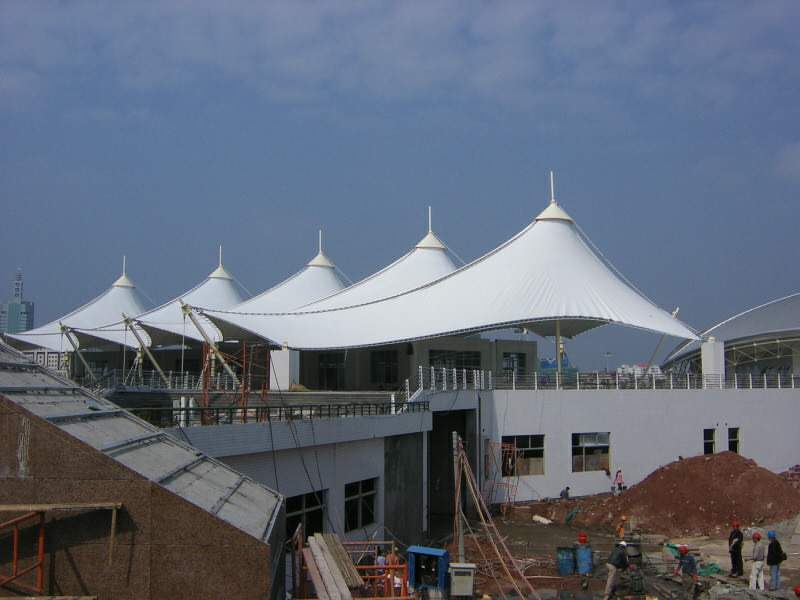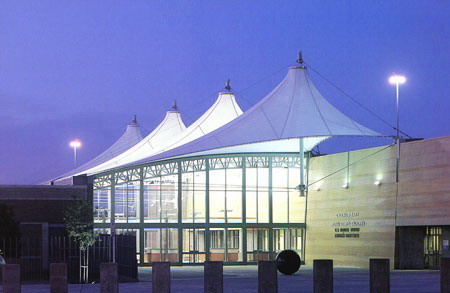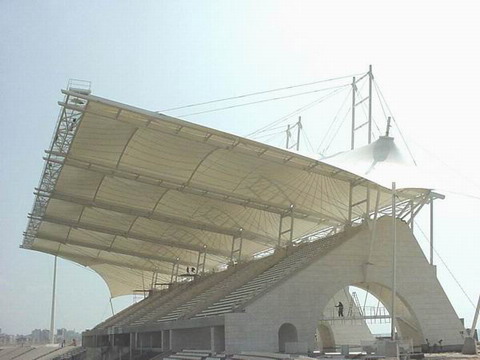Contact HOFO
Mobile:+86 15012841936
WhatsApp:+8615012841936
WeChat:15012841936
Skype:+8615012841936
E-mail:hofosales@hotmail.com
Address: Room 412, Siyufu, Number 10, Nanxin Road, Longgang District, Shenzhen, China
Olympic Shooting Venue in London - Membrane Structures on Sport and Transport Facilities
Olympic Shooting Venue in London

The Olympic Shooting Venue in London is dislocated from the Olympic village and other facilities used during the Olympics. It is located in south-east London, close to the O2 Arena, which is one of the most significant buildings in the world covered with membrane structure. The shooting venue consists of three buildings with the total capacity of 3500 seats. These buildings are functionally separated, so one is used for the 10 meter competition shooting, the second for the 25 meter competition shooting, and the third one for 50 meters.
The architecture of these three buildings is unique and previously unseen in the world. Membrane structures are used for both the roof and the facade. The basic forms of these structures are simple cuboids with different side lengths. The originality of this design lies in the fact that one of the main structural requirements for membranes, the need for double curvature, is here skillfully used as an esthetical element on the facade and the roof. This element is designed so it fits the function of the buildings perfectly. The cones on the facade and the roof that give double curvature to the structure are directed outwards, which undoubtedly looks like the membranes have been shot at from the inside. The “holes” are emphasized by different colors, and the membrane is realistically deformed. One must pay the tribute to the designer for representing the function of the building on the facade so successfully, both in the phase of creating the idea, and realizing the idea. This is done in a way that is not too intrusive to the observer, with minimal use of details, but with a strong impact.
The buildings differ in spans, and in colors used for the “holes“. The largest building has them colored in purple, the medium in orange and the smallest in blue. One of the main characteristic of these buildings is that they are designed so they can be completely assembled, and disassembled. The buildings are assembled for the Olympics in London, and will be also used for the Paralympics, after which they will be disassembled. They will be transported to Glasgow and reused for the Commonwealth Games in 2014. A similar concept was seen at the Olympic stadium in London, also covered with a membrane structure. A part of the stands of the stadium are designed so they can be reused in Brazil for the Football World Championship in 2014. Such a flexible structural design of public facilities is innovative and completely justified in financial and energy efficiency sense. During events the number of users is enormously higher compared to the inactive period, so the flexible capacity leads to savings, and also has less environmental impact. Further progress in creating flexible buildings can certainly be expected, and membrane structures will certainly find their place in this trend because they can be quickly assembled and disassembled.
The support structure is the same in all three buildings. Steel trusses are positioned in two orthogonal directions. Stands are also made out of steel so they can be disassembled. The supporting structure is covered with membranes from both upper and lower sides. In this way, one type of double façade is created. This produces much better thermal and acoustical properties of the buildings. The double façade is designed to have a controlled air temperature between the two membranes. PVC membranes were used for the facades and the roof of all three buildings. The reason for selecting the PVC membrane rather than the PTFE membrane is the fact that it has better properties related to repeated disassembly and transport, which are planned for these structures.
Excerpt from: masterbuilder
Vuk Milosevic, Nikola Cekic,
Miomir Vasov , Milos Dacic
Faculty of Civil Engineering and Architecture, University of Nis
Relevant Information
- Landmark Polish stadium reopens followin
- Expo Axis - Membrane Structures on Sport
- Durban Stadium - Membrane Structures on
- Olympic Shooting Venue in London - Membr
- Rosa Parks Transit Center - Membrane Str
- Nine Projects by Pritzker Prize-Winning
- Concert venue canopy design inspired by







